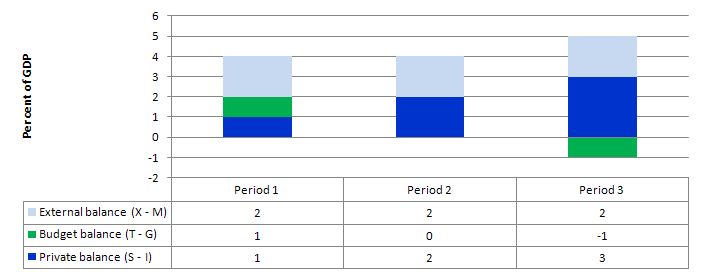
Assume a nation is running an external surplus equivalent to 2 per cent of GDP and the private domestic sector is currently saving overall 1 per cent of GDP. In this situation, the government must be running
Answer: A surplus equal to 1 per cent of GDP.
The answer is Option (b) - A surplus equal to 1 per cent of GDP.
Please refer to the explanation in Question 1 for the conceptual material required to understand this question and answer.
What economic behaviour might lead to the outcome specified in the question?
The following graph shows three situations where the external sector is in surplus of 2 per cent of GDP and the private domestic balance is in surplus of varying proportions of GDP (note I have written the government balance as (T - G).
In Period 1, the private domestic balance is in surplus (1 per cent of GDP) and the government balance is also in surplus (1 per cent of GDP). The net injection to demand from the external sector (equivalent to 2 per cent of GDP) is sufficient to "fund" the private saving drain from expenditure without compromising economic growth. The growth in income would also allow the government balance to be in surplus (via tax revenue).
In Period 2, the rise in private domestic saving drains extra aggregate demand and necessitates a more expansionary position from the government (relative to Period 1), which in this case manifests as a balanced government position.
Period 3, relates to the data presented in the question - an external surplus of 2 per cent of GDP and private domestic saving equal to 3 per cent of GDP. Now the demand injection from the external sector is being more than offset by the demand drain from private domestic saving. The income adjustments that would occur in this economy would then push the government balance into deficit of 1 per cent of GDP.
The movements in income associated with the spending and revenue patterns will ensure these balances arise.
The general rule is that the government deficit (surplus) will always equal the non-government surplus (deficit).
So if there is an external surplus that is greater than private domestic sector saving (a surplus) then there will always be a government surplus. Equally, the higher the private saving is relative to the external surplus, the larger the government deficit.
The following blogs may be of further interest to you: